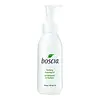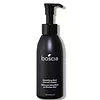What's inside
What's inside
 Key Ingredients
Key Ingredients

 Benefits
Benefits

 Concerns
Concerns

 Ingredients Side-by-side
Ingredients Side-by-side

Water
Skin ConditioningHydrogenated Starch Hydrolysate
HumectantDisodium Cocoyl Glutamate
CleansingDiglycerin
HumectantAcrylates/Steareth-20 Methacrylate Copolymer
Sodium Cocoyl Glycinate
CleansingButylene Glycol
HumectantMethyl Gluceth-10
EmulsifyingSodium Cocoyl Glutamate
CleansingSimmondsia Chinensis Seed Extract
AbrasiveEpilobium Angustifolium Flower/Leaf/Stem Extract
Skin ConditioningRosmarinus Officinalis Leaf Extract
AntimicrobialCamellia Oleifera Leaf Extract
AstringentHydrangea Serrata Leaf Extract
Skin ConditioningPelargonium Graveolens Flower Oil
MaskingCitric Acid
BufferingGlycerin
Humectant1,2-Hexanediol
Skin ConditioningCaprylyl Glycol
EmollientCellulose Gum
Emulsion StabilisingSclerotium Gum
Emulsion StabilisingTrisodium Ethylenediamine Disuccinate
Sodium Lauroyl Glutamate
Sodium Chloride
MaskingPolysorbate 20
EmulsifyingWater, Hydrogenated Starch Hydrolysate, Disodium Cocoyl Glutamate, Diglycerin, Acrylates/Steareth-20 Methacrylate Copolymer, Sodium Cocoyl Glycinate, Butylene Glycol, Methyl Gluceth-10, Sodium Cocoyl Glutamate, Simmondsia Chinensis Seed Extract, Epilobium Angustifolium Flower/Leaf/Stem Extract, Rosmarinus Officinalis Leaf Extract, Camellia Oleifera Leaf Extract, Hydrangea Serrata Leaf Extract, Pelargonium Graveolens Flower Oil, Citric Acid, Glycerin, 1,2-Hexanediol, Caprylyl Glycol, Cellulose Gum, Sclerotium Gum, Trisodium Ethylenediamine Disuccinate, Sodium Lauroyl Glutamate, Sodium Chloride, Polysorbate 20
Glycereth-26
HumectantGlycerin
HumectantSodium Cocoyl Glutamate
CleansingSodium Lauroyl Glutamate
PEG-120 Methyl Glucose Dioleate
EmulsifyingCharcoal Powder
AbrasiveCynara Scolymus Leaf Extract
Skin ConditioningAscorbyl Glucoside
AntioxidantGlycyrrhiza Glabra Root Extract
BleachingGlycolic Acid
BufferingSimmondsia Chinensis Seed Extract
AbrasivePelargonium Graveolens Flower Oil
MaskingEpilobium Angustifolium Flower/Leaf/Stem Extract
Skin ConditioningCitrus Paradisi Seed Extract
MaskingWater
Skin ConditioningGlucosyl Hesperidin
HumectantCeteth-25
CleansingOleth-10
EmulsifyingXanthan Gum
EmulsifyingButylene Glycol
HumectantPolysorbate 20
EmulsifyingGlycereth-26, Glycerin, Sodium Cocoyl Glutamate, Sodium Lauroyl Glutamate, PEG-120 Methyl Glucose Dioleate, Charcoal Powder, Cynara Scolymus Leaf Extract, Ascorbyl Glucoside, Glycyrrhiza Glabra Root Extract, Glycolic Acid, Simmondsia Chinensis Seed Extract, Pelargonium Graveolens Flower Oil, Epilobium Angustifolium Flower/Leaf/Stem Extract, Citrus Paradisi Seed Extract, Water, Glucosyl Hesperidin, Ceteth-25, Oleth-10, Xanthan Gum, Butylene Glycol, Polysorbate 20
Alternatives
Ingredients Explained
These ingredients are found in both products.
Ingredients higher up in an ingredient list are typically present in a larger amount.
Butylene Glycol (or BG) is used within cosmetic products for a few different reasons:
Overall, Butylene Glycol is a safe and well-rounded ingredient that works well with other ingredients.
Though this ingredient works well with most skin types, some people with sensitive skin may experience a reaction such as allergic rashes, closed comedones, or itchiness.
Learn more about Butylene GlycolWe don't have a description for Epilobium Angustifolium Flower/Leaf/Stem Extract yet.
Glycerin is already naturally found in your skin. It helps moisturize and protect your skin.
A study from 2016 found glycerin to be more effective as a humectant than AHAs and hyaluronic acid.
As a humectant, it helps the skin stay hydrated by pulling moisture to your skin. The low molecular weight of glycerin allows it to pull moisture into the deeper layers of your skin.
Hydrated skin improves your skin barrier; Your skin barrier helps protect against irritants and bacteria.
Glycerin has also been found to have antimicrobial and antiviral properties. Due to these properties, glycerin is often used in wound and burn treatments.
In cosmetics, glycerin is usually derived from plants such as soybean or palm. However, it can also be sourced from animals, such as tallow or animal fat.
This ingredient is organic, colorless, odorless, and non-toxic.
Glycerin is the name for this ingredient in American English. British English uses Glycerol/Glycerine.
Learn more about GlycerinPelargonium Graveolens Flower Oil is the pressed oil of the Rose Geranium plant. It is volatile, meaning it evaporates off the skin.
Fragrant components of Rose Geranium include citronellol and geraniol. These may cause allergies and skin-sensitivity. We recommend speaking with a professional if you have any concerns.
The scent of Rose Geranium closely resembles traditional roses.
Learn more about Pelargonium Graveolens Flower OilPolysorbate 20 is made by combining ethoxylation of sorbitan, ethylene oxide, and lauric acid. It is a mild cleansing agent, surfactant, and emulsifier.
As a surfactant, it helps collect dirt and oils for washing. Emulsifiers prevent oils and water from separating.
Polysorbate 20 also adds scent to a product. Since it is made using sorbitol, it has a sweet scent. Sorbitol can also be found in fruits such as apples and peaches.
The lauric acid used to create Polysorbate 20 is often derived from coconuts.
Polysorbate 20 may not be fungal acne safe.
Learn more about Polysorbate 20Simmondsia Chinensis Seed Extract is an exfoliant.
Sodium Cocoyl Glutamate is a gentle cleanser and surfactant. It is the sodium salt of the Cocoyl Glutamic Acid and comes from coconut oil. As a surfactant, it helps lift dirt and oil to be washed away.
Sodium Cocoyl Glutamate also has an emolliating effect and can help leave the skin feeling soft.
Sodium Lauroyl Glutamate is the sodium salt from the lauric acid of glutamic acid.
It is a surfactant and helps cleanse the skin. Surfactants gather oil, dirt, and other pollutants from your skin so they may be washed away easily.
Water. It's the most common cosmetic ingredient of all. You'll usually see it at the top of ingredient lists, meaning that it makes up the largest part of the product.
So why is it so popular? Water most often acts as a solvent - this means that it helps dissolve other ingredients into the formulation.
You'll also recognize water as that liquid we all need to stay alive. If you see this, drink a glass of water. Stay hydrated!
Learn more about Water